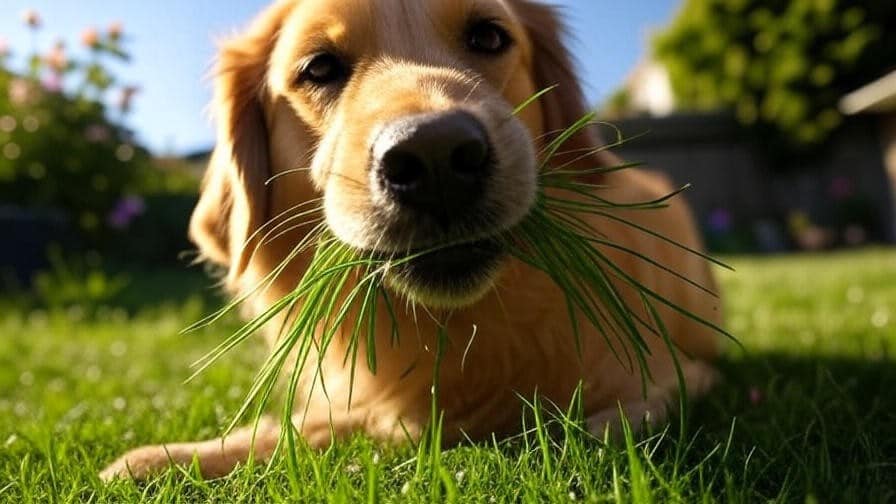If your dog eats grass, is it because they are unwell, do they want to vomit, or could there be another reason for this lawn-munching behaviour? If you’ve noticed your dog nibbling at the grass, you might be wondering whether it’s a cause for concern or just a normal quirk.
Quick Snippets
- Eating grass is common in dogs and usually not a cause for concern.
- Some dogs eat grass to soothe mild stomach upset or simply because they enjoy the taste and texture.
- Occasional grass eating is normal, but frequent vomiting or excessive chewing should be checked by a vet.
- Offering a balanced diet and regular vet checkups can help reduce grass-eating habits.

Why does my dog eat grass?
Eating grass is a very common behavior in dogs, and for most, it’s completely normal.
Dogs may eat grass for several reasons:
- Some simply enjoy the taste or texture
- It can be linked to boredom or lack of stimulation
- A few may eat grass when they feel unwell or want to vomit
- It may relate to fibre in the diet
- Some researchers believe it could help with parasites
Important: If you are ever concerned about your dog’s health or behavior, you should contact your vet for advice.
Reasons your dog may be eating grass
They simply like it
Dogs aren’t just meat-eaters. They’re omnivores, which means they naturally eat both meat and plants. Many dogs seem to enjoy the flavour or texture of grass, especially at certain times of year when it may taste or smell different.
They’re bored
Dogs that don’t get enough mental stimulation may look for other activities to pass the time, such as chewing, digging, or grazing on grass.
They want to be sick
It’s a popular belief that dogs eat grass to make themselves vomit or settle an upset stomach. While this can happen, studies suggest it’s not common. A survey of over 1,500 dogs found that fewer than 10% showed signs of illness before eating grass, and only about a quarter vomited afterward.
They need fibre
Some researchers think grass eating could be linked to fibre intake. In one case study, a dog that regularly ate grass and vomited for years stopped once placed on a high-fibre diet.
Note: Always speak to your vet before changing your dog’s food or adding supplements.
It may help with parasites
There is also a theory that eating grass can help flush out intestinal parasites. Because grass is largely indigestible, it could wrap around worms or other organisms and move them out of the body as it passes through.
Reminder: Regular worming treatments recommended by your vet are the best way to protect your dog against parasites.
Is it normal for dogs to eat grass?
Yes, eating grass is considered normal. A survey of dog owners found that nearly 70% of dogs ate plants at least once a week, with younger dogs being especially likely to do so. Wild dogs have also been observed eating grass, showing that this behavior isn’t unique to pets.
Should I stop my dog from eating grass?
In most cases, eating grass isn’t harmful, and you don’t need to stop your dog if they’re otherwise healthy and the grass is untreated. However, keep in mind:
- Grass treated with fertilisers, herbicides, or pesticides can be toxic
- Slugs and snails on grass may carry lungworm, which can infect dogs
- Dogs that eat grass excessively, vomit often afterward, or appear unwell should be seen by a vet
Important: Never allow your dog to eat grass that may have been treated with chemicals.
What should I do if my dog eats grass?
Occasional grazing is normal and doesn’t usually need intervention. But you should contact your vet if your dog:
- Eats grass but refuses their normal food
- Consumes large amounts of grass regularly
- Keeps vomiting after eating grass
- Shows other signs of illness such as diarrhoea, constipation, or lethargy
If your dog eats grass mainly from boredom, giving them more physical and mental stimulation may help. Try longer or more engaging walks, puzzle feeders, or play sessions.
How can I stop my dog eating grass?
If grass eating is only occasional, you probably don’t need to stop them. But if it becomes frequent, seems linked to illness, or causes concern, it’s best to seek veterinary advice. Your vet can check for underlying issues and guide you on whether a dietary change or further testing is needed.
Providing more enrichment, exercise, and safe chew toys can also reduce the habit if it’s caused by boredom.
Final thoughts
For most dogs, eating grass is a harmless and normal behaviour. Many simply enjoy it, and it doesn’t necessarily mean they’re sick or missing nutrients. But if your dog eats grass obsessively, vomits regularly, or shows other signs of illness, it’s important to consult your vet.
Eating grass isn’t usually a problem—but staying alert to changes in your dog’s behaviour and health is always the safest approach.






